Andor creator Tony Gilroy answers our burning questions after the season finale
- Oops!Something went wrong.Please try again later.
SPOILER ALERT: This article contains spoilers on the season 1 finale of Andor.
Throughout Andor's critically acclaimed first season, viewers have seen Cassian Andor (Diego Luna) go from a somewhat lost mercenary searching for a purpose to a burgeoning Rebel leader who is finally ready to join the fight against the Empire. While season 2 will build toward Cassian's eventual sacrifice in Rogue One, there is still a lot of road to explore not only for Cassian, but for all the characters we met during the initial batch of episodes.
Before season 2 started production this week, Andor showrunner Tony Gilroy took a short break to sit down with EW's Dagobah Dispatch podcast and answer some of our burning questions about season 1 and the just released finale. While he was cagey about whether we would see some familiar Rebellion faces like Bail Organa (Jimmy Smits) next season, he was more than willing to resolve some lingering mysteries like whether Kino Loy (Andy Serkis) survived Narkina 5, or whether Cassian's adoptive mother, Maarva (Fiona Shaw) might still be alive. Read on below for the answers, or listen to the entire interview on the latest episode of Dagobah Dispatch.
ENTERTAINMENT WEEKLY: Can you tell us a little bit about where we can expect to see Cassian at the beginning of season 2?
TONY GILROY: Well, we spent 12 episodes and the better part of a year taking him from utter disillusionment and self-interest and just the worst day of his life and having him go through the stations of the cross and of revolution basically, and make the huge odyssey that he does. What he says at the end is true. That's really a blood oath, that's he's in. I don't think that question will be in doubt. I don't think that's an issue going forward. He's all in, so we're gonna juggle four years in the second half. And the food we will be consuming on that he has to become a leader. And what does that mean?
He has to negotiate his way through the Luthen Rael (Stellan Skarsgård) experience and the benefits and disasters that that means and that relationship. And what's happening on a large scale is that canonically we're gonna end up in Yavin. Our show's gonna end up in Yavin and he'll walk out and he'll be there to be the guy who gives his life. But that alliance in Yavin – are those the hardcore revolutionaries who really built everything? Or it's sort of the coalition government there that's already contentious. Well, what happens and what has happened to all the original gangsters and outliers and all the people who built this thing along the way, and how do you operate when your business is paranoia?
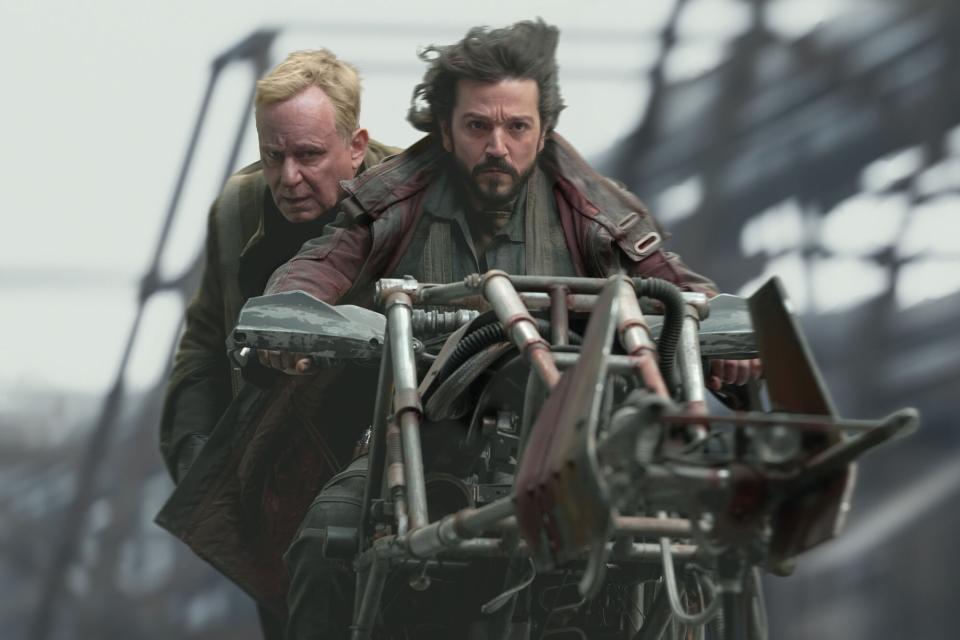
Des Willie/Lucasfilm Ltd. Stellan Skarsgard and Diego Luna in 'Andor'
How do you collaborate when paranoia and secrecy are your product? How do you scale up? How do you join forces? And how does the empire exploit those differences? What are the effects of time on these people? And then obviously within that, we're gonna try to tell a really, a ripping yarn, a really good adventure story. And we're gonna try to have all the relationships and all the love and all the betrayal and all the other stuff. But yeah, he's in, he's committed. So now it's what do you do with it?
Something that I've always been fascinated with this period in Star Wars, is that all the different elements of the rebellion where you have the Mon Mothma (Genevieve O'Reilly) and Bail Organa side of it, and then you had the Saw (Forest Whitaker) extremist side of it, and now you have Luthen who's even more extreme than Saw is. Are we gonna see even more factions within the Rebellion? And how does Luthen really fit into this whole situation considering he's willing to sacrifice whatever he can for the Rebellion where we've seen other people aren't quite so quick to cut people down?
I'm gonna sort of just dial into the answer I just gave because I'm not gonna specifically say who we're gonna see or not gonna see, but Luthen's problem is, it's evidenced by his anxiety when Aldhani goes. He's been building something for 13 years or whatever it is. And Aldhani is the debutante ball for him. It's really coming out of the thing. And what was so much fun was for Denise Gough's character, Dedra, to make her so insightful. She goes to the meeting the next morning when they have the emergency meeting, and "Oh my God, there's been this raid on Aldhani and we're gonna do all these things and we're gonna change the laws," and all that stuff.
And she's so upset when she gets back to her office and her assistant says to her, "Why are you so upset?" She goes, "They're treating this like a robbery. It's an announcement." And she realizes she's in tune. She's a hunter who understands her prey. And that's that little moment there. And then you see some fissures along the way with him. [Luthen's] anxiety is building. What do you do? How do you take a start-up outta your garage? And how do you scale up paranoia and if you've been your own boss for all this time and how do you work with other people? I'm not gonna get into what other factions or legacy characters we're gonna be dealing with, but that's the answer to the question.
Luthen is there on the ground when he sees Ferrix and Maarva's great call to rebellion. What is he thinking when he's starting to see that? He's there just to kill Cassian, but then there's a whole entire rebellion that starts taking place. What is he thinking specifically in that scene?
I think he's proud. I mean, my God, he's just so proud. Oh my God. Her speech? You just see him warm up as her speech goes on and that's everything to him. I mean, he's trying to spread that seed everywhere he possibly can and look at what happened here. No, I think it's his dream.
I know you have the magnificent Fiona Shaw, was there sort of a temptation to sort of write a death scene for her? Or did you think: What more could you need than Fiona Shaw delivering a great speech to rebellion?
No, I was really pleased a week or so ago, because I do voyeuristically drop in on Twitter every day and see what the hell's going on and what people are saying.
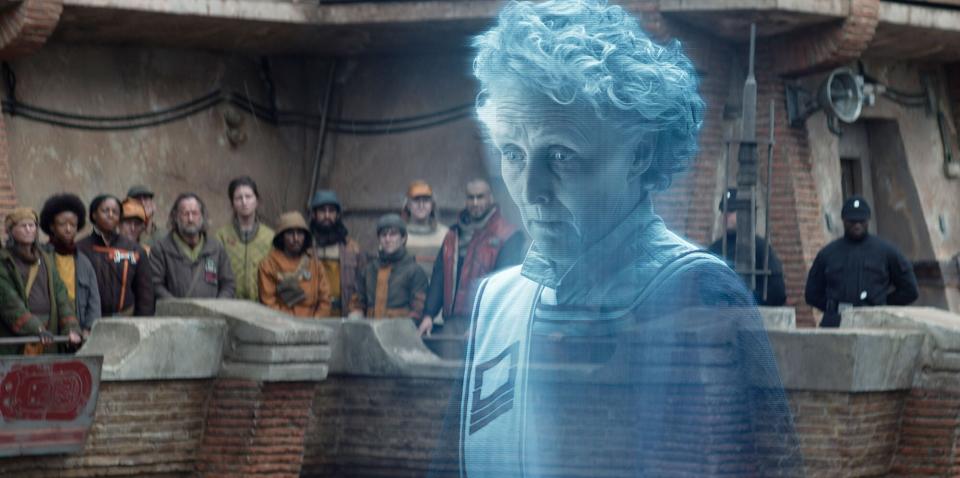
Lucasfilm Ltd. Fiona Shaw as Maarva in 'Andor.'
I loved the idea that, "Oh my God, Tony Gilroy knows how to do all the same, but he puts her death off screen. Did they have a production problem or was it a scheduling issue or what was it? Why would he do that?" And, no, I knew I wouldn't have done that if I didn't know I had the eulogy. I had the eulogy idea a long time ago, so having that in my hip pocket makes it almost mandatory that I do it this way. Yeah. So it was good. It's a fun bit of writing.
It did throw off my fellow podcast hosts who were wondering if Marva was really dead. And I thought she's pretty much dead after I saw the eulogy.
Oh, I know. I saw that theory. I love that theory. I saw somebody with a theory, "Oh my God, she's not dead. They're sneaking her out of there. It's Cassian's way of getting her free and they think she's dead." And I was like, "Wow, that's a viable idea," but that's not what we're doing.
Speaking of somebody else that people have been very curious as to whether they survived or not. We've got Andy Serkis as Kino Loy. I know there's a ton of people who are very curious as to whether Kino survived. I personally think he might have just been like, "Screw it, I'm gonna try and float." He was such a great character. Are we possibly gonna see him in the future?
He doesn't die. I don't know. We don't see him die.
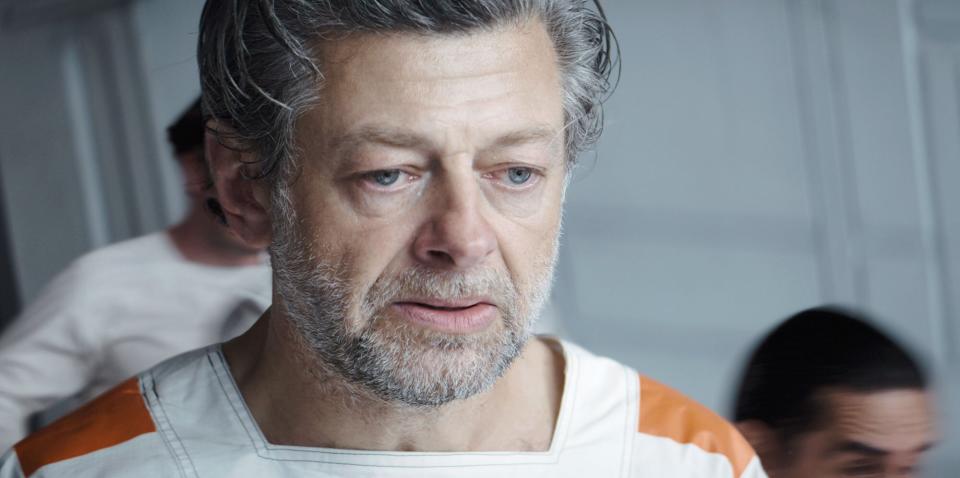
Lucasfilm Ltd.
Switching over to Mon Mothma, she makes a huge decision to sell out her family in this. Can you tell me a little bit about her finally crossing that ethical line? Because that's a big jump for her. She's in the Rebellion, but she's trying to do it in the most ethical manner that she can, which is not something Luthen really considers at all.
Well, I mean, Mon has the arguably the hardest road of any character in the show because everything she has to do is under glass. Everything is observed. She has no place to hide. She can't shoot a gun or go jump off a cliff or blow something up. She has no cathartic physical way to escape from the trap that she's in. I mean, just go be her in that moment and consider all the various possibilities. Because if she goes down, everything goes down and what happens to her family then? Every decision that she has is tough.
And, it's assuaged in a very hopefully interesting and weird way by the fact that her daughter is becoming sort of orthodox, old school Chandrilan and going back to these old ways and confusing everything. And imagine how that makes her feel? Because you feel like, "Oh my God, we spent all this time escaping from all that. And have I been a bad parent, if I'd been a better parent, would she not be doing that? Why is she doing this?" And the delusion that you can control your children and the swarm of anxieties that she has. I'm sympathetic, there isn't a character in the show that I'm not sympathetic for, just every single one of them. But I have to be. When I put her on, it's very uncomfortable. She doesn't have a lot of good choices.
We didn't really know much about Mon Mothma before this. She's been sort of this figurehead of the Rebellion, but I had no idea she was married or that she was a mother and all of these other things that we saw. But the decision in the end is that she's in a tight spot and she needs to get herself out of it. And, I thought that was interesting that she was willing to cross a line that she hadn't been before because things were really starting to get dire for her.
It ruins everything. My God, I mean when Vel comes there and Vel realizes what she's doing and then she explains everything. Vel in the beginning is like, you "My God, you couldn't possibly be doing that!" By the time she finishes explaining everything, Vel realizes the scale of it and doesn't raise her hand. Everything goes down. That's a dramatic card that has real utility in a lot of different places, which is the stakes for a lot of people. A lot of different situations don't just involve themselves. They have all kinds of subsidiary and collateral damage.
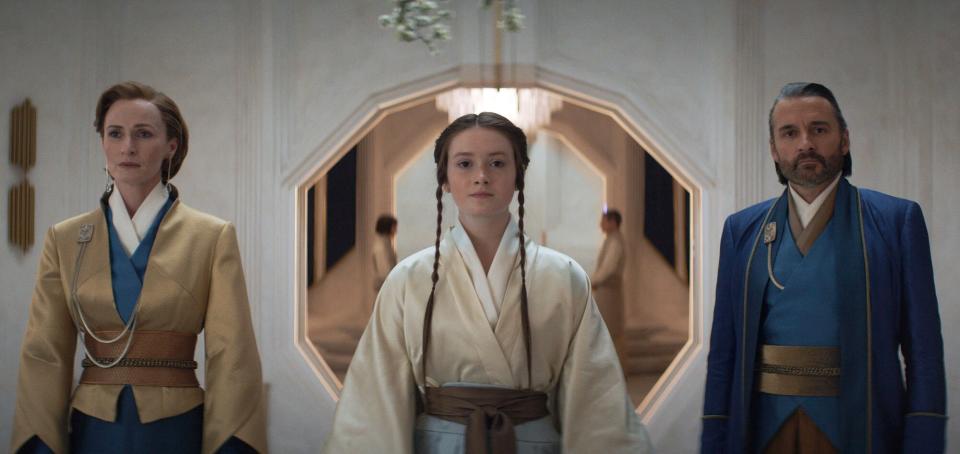
Lucasfilm Ltd. Genevieve O'Reilly as Mon Mothma, Bronte Carmichael as Leida, and Alastair Mackenzie as Perrin Fertha.
For the longest time in Star Wars, we've seen the Rebellion as being between the Light Side versus the Dark Side — the Skywalker family dysfunction. But in Andor, you're really bringing it down to what it feels like for people on the ground, which is the fight between freedom and the encroaching fascism. Was avoiding that fantasy element of the Force a way to keep the story grounded? Was that something you just wanted to push away from?
Well, they've done all that already. I mean, they did all that. That's one thing. I don't wanna do something that somebody did already. That's literally where I start everything, doesn't matter what it is. If we can't do something different, then let's not do it. Now, obviously, you're not gonna reinvent everything, but that's literally where I start everything. And then, I don't think most of the beings, creatures, humans or otherwise in that galaxy have ever seen a lightsaber. I don't think they know what any of that stuff is.
Most people don't have any idea that there's a royal family or that this stuff is going on. It doesn't concern them. They're trying to do their lives and they're trying to do things. And fortunately, Lucasfilm and Kathy Kennedy and Disney by association were really interested in opening a really new lane. It's not just that our show is a new thing. It also opens the possibilities to all kinds of other things. A lot of blood and treasure have gone into those other ideas, it doesn't seem like that would be something that you would wanna redo.
Is there anything that you learned in the making of season 1 that you're going to bring into season 2? Or is it just too much to name?
I was very, very naive when I came into this and I'd been doing this my whole life, but I was still incredibly naive about what I was getting into because of the scale of it and the ultimate abundance of it and what we were gonna end up doing and what it was gonna take and all the rest of it. What I've learned is that it's just epic. The amount of things that I've learned I thought I knew. I thought I knew everything about scoring movies and music and doing scores for films. And Nick Britell and I both ended up doing seven hours of music and I think we both hit the ground going "Okay, we know how to do this. This is what we're gonna do." And halfway through we're like, "Oh my God, I can't believe what we've learned."
I've learned an incredible amount about everything, but I know now how to manage the show better. I know how to delegate better so I don't burn out. I've learned the absolute vital necessity of my department heads and my producing partner, Sanne Wohlenberg. There's no show — nothing would exist without her. She's the other half of what I do. Luke Hull is my production designer, my primary writing companion. He's my first collaborator because we have to design everything first. I had my brother John, who is the whole back end of the show, who just backstops everything.
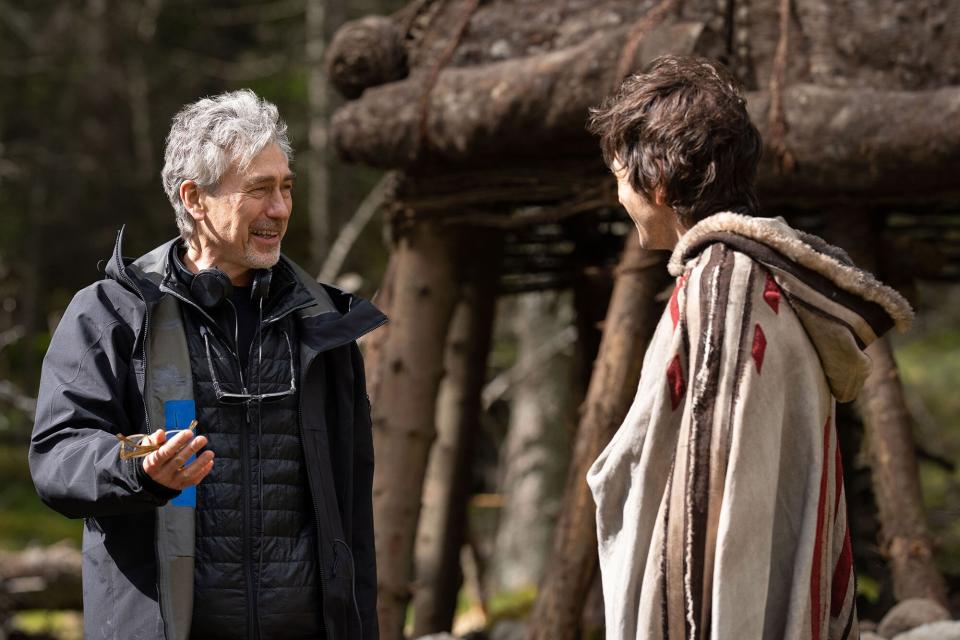
Des Willie/Lucasfilm Ltd. Tony Gilroy and Diego Luna on the set of 'Andor.'
It's just a whole fundamental thing. And we've surrounded ourselves with all these really remarkable, obsessive people that we try to reward and make everybody feel like a filmmaker. So we have a really good culture that's established but I also know it's sort of like having kids. You don't know. You have a kid and you're like, "Oh my God, if I knew it was gonna be like this, would I have done it?" You're really happy you did it, but you can't believe. And then you like, "Oh my God, we're gonna do it again." So we're gonna do it one more time. We [just started shooting] on Monday, so the last couple days have been very gut checky for everybody.
And I think everybody is of the hive mind that we know what we have to do. We can't let off, we can't congratulate ourselves or take all this affirmation for granted. We know what we have to do, but we know we can do it and we know how good it feels and how much fun we can really have, even if we're exhausted, how much fun we can have doing it. So, there's a lot. There's a big advantage to making your first movie. You make your first movie because you don't even know. You're blind. You're like, "I'll do that." And you don't know you're going over the Niagara Falls. It's the second parachute jump is always the scariest one, they say, for people who jump out of airplanes. It's not the first jump. It's the second one that's really scary. So I know the shoot will open, but it's still "Oh my God."
This interview has been edited for length and clarity.
To hear more from Tony Gilroy, check out his full Andor interview on the latest episode of EW's Dagobah Dispatch., where you can also hear from the likes of Ewan McGregor, Hayden Christensen, Rosario Dawson, Pedro Pascal, and more.
Want more TV news? Sign up for Entertainment Weekly's free newsletter to get the latest trailers, celebrity interviews, film reviews, and more.
Related content:

